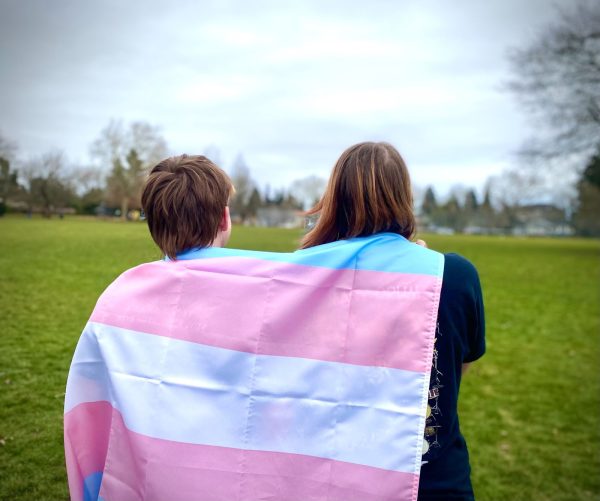
“I remember my friends and I being at rehearsal on election night and just being terrified and hugging each other while we watched the [vote count] go up. It’s so debilitating to know that, even though some of the policies being put in place will directly affect me and my community, there’s not much I can actually do about it.”
This particular story belongs to KJ Ramsay, a 15-year-old gender-fluid student at Ida B. Wells High School, whose feelings of helplessness and terror following Donald Trump’s reelection as president of the United States are shared by transgender youth across the country.
The current political climate in the U.S. is filled with uncertainty for many marginalized people. As of late, those who identify as LGBTQ+ have been heavily targeted. Blair Stenvick, the communications manager at Basic Rights Oregon (BRO) — a non profit LGBTQ+ rights organization based in Portland, OR — lamented that, “[It] seems like almost every day there’s some new news about the federal administration attacking LGBTQ+ folks.”
President Trump issued numerous day-one Executive Orders (EOs) targeting queer and transgender individuals; many of the EOs followed goals outlined in Project 2025. Project 2025 is a federal policy agenda created by former Trump administration officials in partnership with the Heritage Foundation — a conservative think tank. The initiative intends to make many drastic changes to the federal government, including gutting abortion access, enforcing mass deportation, and censoring discussions about race and gender in the classroom.
This laundry list of new policies has greatly contributed to the unease in our socio-political climate as Americans wait to see the extent of the changes. The Human Rights Campaign writes that Trump’s EOs attempt to “end legal recognition of transgender and nonbinary people under federal law,” “[direct] agencies to limit access to restrooms and other single-sex facilities,” “[ensure] transgender and non-binary people will no longer be able to access new or renewed passports that reflect their gender identity,” “[prevent] transgender women from being able to access domestic violence shelters,” and more.
Some EOs may be blocked on account of constitutional violations, but as George Rede, the president of PFLAG Portland — an organization for queer people and their loved ones to join in support of the LGBTQ+ community — eloquently put it, “The first few days of the new administration have shown all of us who yearn and strive for a more just world that we are going to have to fight for it like never before.”
One of the greatest sources of fear in these turbulent times is the unclear future of rights and policies affirming the identities of queer individuals. Charlie Dishman, a science teacher at Franklin and a leader of the Pride Respect Inclusion Support Movement (PRISM) — Franklin’s affinity group for LGBTQ+ students and staff — highlighted the mental exhaustion resulting from the recent EOs. “One of the hardest things about it is that if you are trans, or if somebody you love is trans, you can’t afford to … [dissociate from] this overwhelming information, because you have to stay informed,” said Dishman. “Because of the rate at which these things are coming out, it is like getting knocked down over and over and over again.”
For many Americans, it has been hard not to despair about federal policy endangering trans rights. However, there are little things that everyone can do to try and alleviate the burden on LGBTQ+ people in their community.
Numerous organizations in Oregon are dedicated to aiding and protecting queer and transgender people, especially youth. Getting involved with one such organization is a powerful way to demonstrate your support. Portland’s chapter of PFLAG is an all-volunteer organization that hosts monthly support groups and creates a safe space for queer and trans people and their loved ones. In support of its mission, PFLAG Portland engages in initiatives such as Genders and Sexualities Alliance (GSA) mini-grants and backing Equal Rights for All, a 2026 ballot measure to enshrine the right to gender-affirming care and same-sex marriage in Oregon’s state constitution. Rede shared that, in light of the new national administration, “There has been a surge in the number of people attending our meetings, signing up for newsletter[s], making financial donations, and volunteering to help in any way they can. We are proud and grateful to be seen as a trusted resource.”
Another valuable resource in Oregon is the Sexual and Gender Minority Youth Resource Center (SMYRC), which, according to Elise Gilmore, one of their youth advocates “has been a safe place for queer and trans youth to find community and resources since 1998 … [They] serve young people of various backgrounds, including those who may be experiencing housing instability or homelessness.” SMYRC offers education about important trans-related topics, and resources such as a free food pantry, clothing closet, and basic needs supplies, like menstrual and personal hygiene products and sexual health products. Additionally, they educate youth on safely using gender-affirming garments such as packers, breast forms, binders, and tucking undergarments.
As Portland is a fairly progressive city, its residents have access to many great resources such as PFLAG, SMYRC, Franklin’s PRISM, and BRO. Uncertain times such as these underscore just how important it is not to take these valuable resources for granted, to show appreciation for their role in the LGBTQ+ community, and to show support through volunteering, donating, or otherwise engaging.
On a personal level, it is also just as important to check in with your queer and trans loved ones and let them know that you are there for them. Ellen Whatmore, an English teacher at Franklin, said, “You can’t just assume that people know that you’re in their corner if you’re not speaking up.” Simply checking in with your transgender loved ones and letting them know you support them unconditionally can have a large impact.
Whatmore emphasized that, “If you’re not vocal, then you seem complicit, that you are agreeing with what’s happening. Silence is compliance.” Even small acts of allyship are powerful statements; Whatmore’s own daughter becomes euphoric “when she sees someone wearing a ‘Trans Kids Belong’ or ‘Love Trans Kids’ shirt.” Though some may deem it inappropriate to “wear their politics on their sleeve,” Whatmore mentioned, now is the time to be vocal, show your support, and let the world know there are people who will stand up against discrimination. Topher Olson, a student-teacher at Franklin noted that, “Humans are social creatures, and the sense of psychological safety that comes from knowing you’re not alone is maybe one of the most important things of all.”
It is also important to keep yourself educated and informed. As Olson put it, “The policy changes have made me feel more motivated to try to limit uncertainty and give as much specific, positive, [and] helpful information as I can.” East Esbensen, a non-binary 20-year-old Oregonian, emphasized the importance of knowing of local resource centers — if there are any — and staying informed so you can help transgender people get the care that they need. Simple acts, like respecting people’s names and pronouns, also support trans people. Esbensen lamented that, “For a large collection of people, it feels as if the world is falling apart and although we can’t necessarily fix anything or promise that everything will be alright, we at least have each other to lean on for support and comfort during this really scary time.”
The transgender community has been through a lot. Dishman commented, “I just want to remind queer and trans youth that they are part of a culture that’s strong and resilient … It’s beautiful to know that, as much as it’s a struggle, they’ve done it before … It doesn’t make it any easier that time around, but the resilience is there. They’re ready to fight, and their community is ready to fight for them.” No matter what happens, “You’ve got people in your corner, and … that’s what keeps the hope [alive].”
The bravery it takes to be out, proud, and unapologetically gender expansive is incredible. As Americans — and as humans — we should be doing everything we can to support and uplift each other, so that we may all live in a way that feels genuine, and allow everyone — young and old — to see a future for themselves in which they can be free to live as who they truly are. “We got this,” said Dishman, “[and] we will work our way through this.”


































